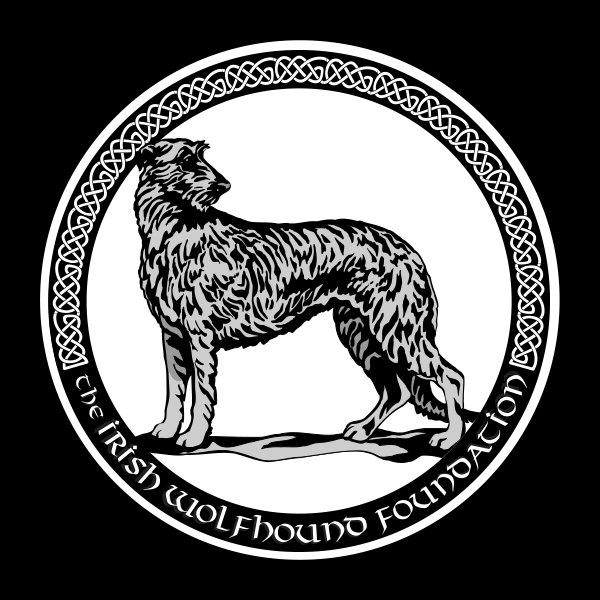The AKC Canine Health Foundation is funding a grant proposal to investigate the Genetic Basis of Early Onset Osteosarcoma in the Irish Wolfhound. The IWF and the IWCA are providing support via their donor directed funds.
Osteosarcoma kills 20% of our hounds with no improvement in that statistic since 1986.
There appears to be a special group of hounds that develop OSA at a very young age and these hounds are the focus of this research. A genetic test to identify these hounds before breeding would be helpful. This research - the first genetic osteosarcoma study involving only IWs - is being led by Dr Susannah Sample and the Comparative Genetics Research Lab Team at the University of Wisconsin-Madison. There have been many calls for blood and funding to help our hounds with OSA and only minimal steps forward thus far. However looking at a more defined problem and with better technology improves chances of meaningful results.
Included but not entirely covered by the CHF grant is the creation of a state of the art IW Genome. The IWF and the IWCA will help support this with additional funding. This high quality DNA code for the IW will be used for the osteosarcoma study and then made available for the wider canine research community.
This Is A Really Big Deal
Genetic studies in dogs are often dependent on the use of a reference genome - when researchers look for genetic mutations that associate with disease they need a map to serve as a baseline for DNA code. When the first dog reference genome was was created in 2005 a boxer named Tasha was used.
At the time researchers felt this reference assembled from a single dog was sufficient to reflect the DNA from any dog in any breed. 0ver time this has proven problematic. An Irish Wolfhound is not a Boxer just as a laborador is not a chihuahua.
While use of the boxer genome has worked for many studies it has created roadblocks for others. A high quality IW genome will maximize the chance of finding mutations associated with early onset osteosarcoma in the Irish wolfhound.
An IW bitch has already donated blood and sequencing is ready to begin. A small skin biopsy is growing her fibroblasts to assure an adequate back up supply of DNA.
Again Your Help Is Needed
Covid has temporarily closed many research labs including U of Wisconsin. If blood samples are waiting and ready to go as soon as Covid is stabilized this research will be closer to results. The lab IS able to receive blood samples.
Samples are needed from any IW who developed osteosarcoma before age 5 years. Blood samples are also needed from any IW over 10 years that has not developed osteosarcoma.
If either or both parents can donate a blood sample it is of exceptional value. Samples from affected dogs and parents allow analysis of trios (both parents and affected offspring). This analysis method is a very powerful way to find a genetic mutation.
The team will sequence the entire genome of each enrolled hound mapped to the newly created Irish Wolfhound Reference Genome.
There are many reasons why this study may be a real step forward in controlling the misery caused by osteosarcoma in young IWs.
Please - if you know of a hound or have a hound that could help consider joining this study. The blood samples can be drawn locally. All hound identifiers will remain confidential. Any costs associated with participation will be covered.
CONTACT the Comparative Genetics Research Lab at genetics@vetmed.wisc.edu.
A First Step in Genetic Test Development
The genetics of Osteosarcoma is undoubtedly chaotic. A first step in the untangling is to document the inheritance of the problem in the breed. Based on limited data in the Scottish Deerhound, inheritance is assumed to be autosomal dominant.
Using data points from the LCS and the LCSII the inheritance of atrial fibrillation in the Irish Wolfhound has been documented. The same type of inheritance is suspected for osteosarcoma and this is being investigated now at the University of Wisconsin, again using data points from the LCS and LCSII. Great thanks to all the hounds and owners who helped with this data collection.
Another Approach
There is little chance to eliminate the threat of osteosarcoma in Irish Wolfhounds.
Some advances have been made in treatment but it remains fatal and continues to kill 20% of our hounds.
What if there were a simple blood test to warn of the early onset of osteosarcoma?
Researchers at the University of Minnesota Animal Cancer Care and Research Program (ACCR) led by Dr. Jaime Modiano are working towards this goal.
The ACCR program has made great progress in building this test for hemangiosarcoma. They now want to develop and validate this test for osteosarcoma.
They will need funding and support. The research team has many publications and presentations documenting progress in this approach. Enough preliminary work shows this is not a pie in the sky approach to OSA. This blood test will lead to increased focus on prevention and earlier treatment. And if your hound would test positive at two years you might reconsider a potentially heart breaking breeding. This ties in with documenting the inheritance …. All in all there seems to be some progress.


